We take a look at how pilots can maintain their professionalism while grounded during the pandemic
By Kreisha Ballantyne
While this year has certainly been the toughest in modern history for pilots, restrictions are relaxing.
It’s vital as we move into the summer season that we are adequately backed up with checklists, a greater focus on detailed preflights and perhaps a top-up session with an instructor until our confidence returns to pre-pandemic levels.
The effect of being grounded
Salah Bahmad is a first officer and non-technical skills facilitator for Virgin Australia, who was stood down in March.
‘I have been called in to fly a handful of times since then and that usually coincides with my currency about to expire,’ he says. ‘Depending on how long the borders remain closed, I am still at risk of being made redundant.
It is a strange and unpleasant feeling not to be able to fly regularly
‘While there have been no real changes to the way we operate in the cockpit, we are cognisant of the fact that we aren’t flying as regularly as we are used to. As a result of this, we are taking our time with our scans, checks and briefings. We understand that we share the airspace with other pilots who aren’t current, in airspace with controllers who are working less, flying with cabin crew who have also been stood down for extended periods of time, all the while flying passengers who are anxious, given the state of the world.’
Has being stood down affected his confidence? ‘Absolutely. I am reasonably new to the 737 so I was just starting to get a handle on the machine before COVID,’ he says. ‘The consolidation phase that usually happens after successful check to line is non-existent in the current climate.
‘I am cautiously optimistic about my career but I am preparing for the worst. I have realised how my skills are not easily transferrable. I have made the decision that if I am forced out of aviation due to the current downturn, I am unlikely to return.’
Patrick Groves completed his CPL/MECIR at the Australian Airline Pilot Academy in February 2020. The pandemic has had a devastating effect on his job prospects.
‘As a part of the Regional Express cadetship, work is offered no later than six months after graduation from the course,’ he says. ‘Due to coronavirus, this was adversely affected as the airline put a hold on the hiring of first officers until further notice.
‘Most cadets will prepare for a move interstate on completion of the course. I was one of those cadets prepared for such a move but it didn’t eventuate. Also, after not being employed in the general workforce for the 13 months of my cadetship, it has been extremely difficult to find a job after discovering there would not be work available with REX anytime soon.
‘My previous career was in hospitality as a head chef, so work in my backup career was not available upon graduation, and I have subsequently joined the construction workforce to cover the finances. My wife and I also conceived a child during the cadetship, so having a child during this financial uncertainty has been extremely difficult.’
While the unexpected turn of events has rocked his plans, he’s tried to remain upbeat, attempting to remain current on simulators.
‘I think work will become available towards the end of next year,’ he says. ‘The airline sector will be more desperate for pilots than ever with the demand for travel picking up due to consumer desperation to travel again and the significant loss of experienced pilots that occurred during the pandemic.’
While most media attention has been on airlines, the pandemic also affected general aviation pilots, such as instructor and charter pilot at Yarra Valley Aviation, Graham Bunn.
‘We had not been able to give flying lessons, so it’s pretty simple—no flying and no in-person ground school activity,’ he says. ‘My colleagues organised online theory classes for students who are at an appropriate point in their training, but we had no face-to-face engagement.
‘Anytime I have a lay-off of more than a couple of weeks, I start to feel rusty, so after a couple of months I can almost feel the gears grinding. I know that after a couple of hours of flying I’ll be back in the groove, but it is a strange and unpleasant feeling not to be able to fly regularly.
‘The industry will obviously not recover overnight and as it does so, there will be any number of supremely well qualified, very experienced pilots to fill vacancies. With this in mind, I wonder if as many young people as before will see themselves in an aviation career and be keen to start on the long, expensive journey toward flying for a living.’
Nicholas Christie is the principal broker at Light Aircraft Sales in Melbourne. The restrictions on movement resulted in loss of contracts as potential buyers were unable to inspect aircraft.
However, he says there has been an improved market for high-performance, four and six-seater singles due to reduced passenger services interstate, which is a light at the end of the tunnel for GA.
Carl Brewer is a senior RA instructor and charter pilot at Lilydale Flying School, as well as maintenance, IT and social media ‘gofer’.
‘Aviation is always a boom and bust industry and, as we’re not up to our eyes in debt or overheads, we can survive the short-term downturn,’ he says. ‘In some ways, it’s good for us as we’re able to be responsive with staffing and since we’re not in the business of telling all our clients they’ll walk into an RPT job with a CPL and 150 hours, our credibility is undamaged.
‘To remain current, I’ve invested in some simulator equipment to keep muscle memory with some avionics and done a few maintenance flights when necessary. With the hours I have in the circuit, I’m confident that it’ll only take a couple of quick laps to dial everything back in.’
He has also been involved in the evolution of the school’s ground activities, ‘My role hasn’t changed much as I’m developing more resources for the school and managing our extended community though social media and online seminars to a greater extent, so on the whole it’s the same, sans the flying bit,’ he says. ‘As most of our aircraft are on the ground, my maintenance wrangling has dropped off a bit, but I’m expecting that to ramp up very quickly again. CASA did the right thing with deferring currency requirements and I’m positive we’ll see people come back as soon as they can.’
I’ve invested in some simulator equipment to keep muscle memory
Backing yourself
Planning: Be aware that aerodromes and airports may be changed due to infrequent use. Be on guard for wildlife—more birds and animals may be present on runways and taxiways following periods of inactivity. Be prepared for long grass and possible deterioration of runway and taxiway surfaces. Inspect runways or contact the aerodrome as appropriate.
If you haven’t flown in a while, check documentation for airspace changes, such as Brisbane and Sunshine Coast’s new runway flightpaths and a change to Bankstown’s run-up bay area for runway 11. Be vigilant regarding unusual levels of activity in the circuit which may occur as traffic levels increase. Refresh your procedures for joining, departing and operating in the circuit.
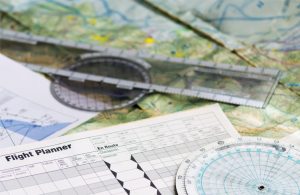
Physical health: If you feel unwell, remain on the ground. If taking prescription or retail medications, obey directions on medication packaging and seek DAME advice if in doubt. Check your medical certificate is appropriate for your flight and, if it has expired, that you are meeting the exemption rules. (casa.gov.au/about-us/covid-19-advice-industry)

Mental health: Assess effects of financial or emotional stress caused by lockdown on your decision-making ability, fatigue level and fitness to fly. Ask yourself if you’re fit to fly and, if you feel in any way anxious about an upcoming flight, consider a session with an instructor before your flight.
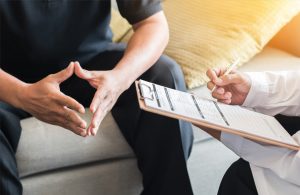
Data sources: Check EFBs and maps are up-to-date, that EFBs have adequate storage for data and ample battery backup.
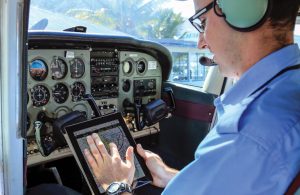
Currency: Ensure your proficiency checks and flight reviews are valid or you meet CASA’s exemption rules. Make sure you meet your currency requirements or any CASA exemptions.
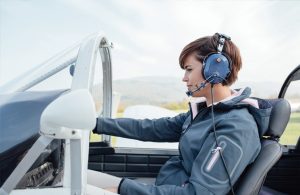
Competency: Make your first flight back something you would be comfortable with – remain local and avoid making it overly complex. If needed, engage an instructor to aid with dusting off the rust.
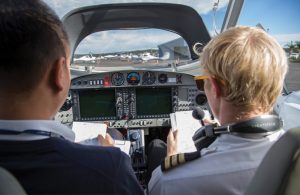
Maintenance and aircraft management
Maintenance is also a pandemic-related issue, according to the owner of a twin Comanche, Graham Bunn. ‘Apart from remaining current as a pilot, aircraft engines do not take very kindly to sitting still for extended periods,’ he says. ‘They need to be current too, in a sense. [During the restrictions] I fired my engines up and sat in the cockpit for 40 minutes while the oil had a bit of an exercise – headphones on, VHF tuned into the area frequency and HF to Southern Flightwatch just for something to listen to. It was almost funny that most of the calls to Flightwatch were simple radio checks. I wasn’t the only one sitting in an aeroplane on the ground.’
Plan ahead: As the restrictions are lifted and everyone wants to fly again, the pressure will be on for all the maintenance to be certified and aircraft returned to service.
Communicate: Contact your LAME/AMO about airworthiness after your aircraft has been parked for longer than usual.
Read the manual: The manufacturer’s maintenance manual has the best answers to the ‘what, how and when’ questions for inspections, storage and type-specific maintenance.
Some tips for backup
Fuel: Drain more fuel than usual to check thoroughly for water contamination.
Documents: Check maintenance release for validity, open items and scheduled maintenance.
PPE: If you choose to wear a mask in the cockpit, check it does not interfere with your headset. If concerned about contamination of the aircraft by previous users, clean interior surfaces.
Resources: flightsafetyaustralia.com/2020/04/maintaining-your-skills-in-isolation

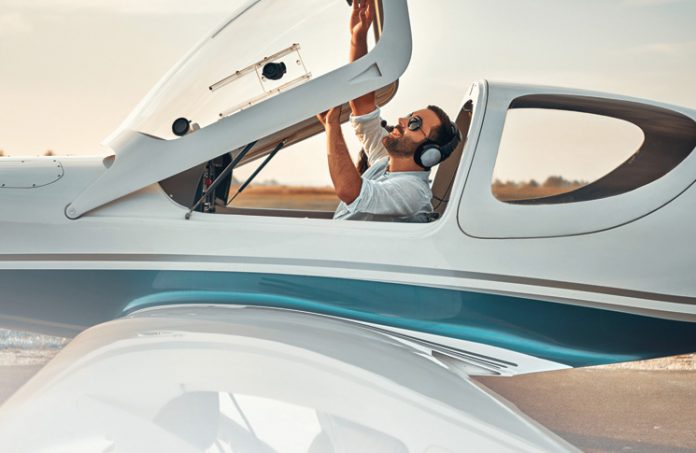

Was working on a site as a non paid builders labourer for a relative, the other builders labourer being paid was an A380 pilot. Such a great person to work with.
I do think overseas pilots training here , and there are plenty, should not be given VISAs as aircrew when things open up again. We have a big log of locals desperate for the work
How about some stories about the LAME’s who detect/troubleshoot and rectify/restore aircraft to a fully airworthy condition that make it possible for skilled pilots to prove their worth.
An article on an organisation such HARS and the work that they do would be nice.
A well thought-out article. Good guidance for the younger pilots who have to shoulder rough financial times. I recently lost my son (47) to anxiety and depression. Maybe if he had read something similar to Kreisha Ballantyne’s excellent advice, then he would have been with us for Xmas Dinner 2020. My son worked at AirServices – Radar technician.
Kreisha – keep up the good work!